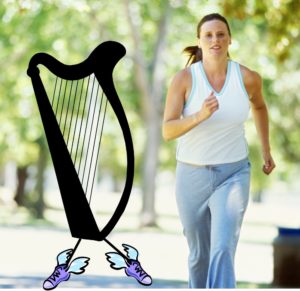Wishing you and yours a wonderful Thanksgiving!
Monthly Archives: November 2014
Close your eyes…give me your hand
Most harpers have some concept of the (likely romanticized) history of the harper – an important contributor to life in the home of the Laird, carrier of news, stories, lore, and intrigue, and provider of music for all events and perhaps for everyday living. Likely you know that at some point harping was an excellent profession for the blind – a job that didn’t require being sighted to be excellent. And of course, we have the Rory’s in history. We are ever so slightly proud of that heritage.
So why then, do I so often hear, “Oh, I have to look!” or “I can’t play without seeing the strings” or some variation on these? I’ve also hear, “I’ll make a complete mess of it if I don’t look!”
And you know what I’ll say to that – you simply need to practice to play without looking! There are so many reasons to play without looking:
- Candle light/poor lighting
- Power cuts
- Outdoor, dusk weddings
- Poor or changing vision
But if you practice playing in low or no light situations you will see a number of improvements:
- Your body will know where the notes are (and will learn that better than if you are always looking)
- You’ll be more confident in a number of situations (listed above)
- You don’t have to remember to carry a light (of course, this assumes you don’t need the music stand!)
If you need a little nudge to start playing in low light, start by practicing at dusk by natural light – and let the night come. It will be very gradual. You’ll learn this way that you can in fact play with little light.
Don’t get discouraged – you had to learn to play by looking – and this is no different…and enjoy – you’ll impress your harp friends too!
Get some exercise – three good reasons
As the winter comes, we want to burrow in, swaddled in sweaters, nursing steaming cups of lovely tea. And we’re likely, given the chill, to get some practicing in which is good given that ‘tis nearly the season and we’ll be asked to play more often. The days are shortening, the nights getting deeper.
It would be easy to crawl back under the duvet, to snuggle in to our beds. But all that snuggling and all that nestling needs to be combated. For your general health and well-being you need to get a little exercise and some fresh air*. And a little exercise and fresh air won’t be amiss in your playing either.
We’re not talking about running a marathon or training for the World’s Strongest Man competition. You can just go for a short walk to gain a benefit. There are three good reasons to get a little exercise this season:
- The simple act of taking a walk outdoors in the winter will help lift your mood. Evidence suggests that even 10 minutes of sunlight a day can help stave off seasonal affective disorder.
- A little time outside can invigorate you (and thereby, your practicing). Think of it as a little wake from your potential long winter’s nap! A short walk can enhance your energy (again directly contributing to your practicing).
- A little extra exercise will also help exorcise those extra cookies that appear in the season and allow you a small measure of perceived virtue! And everything you do to take care of yourself will be reflected in your time at the harp.
So use these three good reasons to get a little light exercise outside, even as the winter deepens and the cold settles in – you’ll be glad of it when you sit at your harp – to practice, to share or to perform.
* Of course, this is not medical advice, nor should you pursue this approach if it is in direct contradiction to advice received from your physician. This post is not intended to diagnose, treat, cure or prevent any disease. Duh.
You are what you think. Now get ready to change your mind.
How do you think about yourself as a musician? A harp player? A performer? A person? Do you ever think about how what you think about you impacts the you that is present?
Are you open and accepting of yourself? How do you talk to yourself? Would you talk to anyone else that way?
Many of us talk to ourselves in a very negative way. But here are 7 ways to turn that around:
- Make time during your practice to provide constructive feedback
- Make kind and gentle feedback comments to yourself in a positive way
- Write down your feedback….and read it again later
- Record yourself so you can provide more objective inputs at a later time and from a different perspective
- When you are not very nice to yourself, stop, correct yourself, and restate your thought in a positive, constructive way – the way you would to another person
- Take your time not only observing yourself and the way you think, but also to reconstruct the kernel of the original message in a positive and useful way.
- Lather, rinse, repeat!
You can change your mind by practicing reframing your comments to yourself. And it will get easier…with practice!



